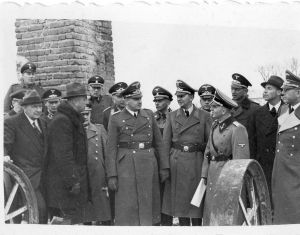Hans Frank
Generalgouverneur and Reichsminister
Hans Frank – centre in the General Gouvernement
Hans Frank was born in Karlsruhe on 23 May 1900, the son of a barrister who had been struck off for corruption. After a brief spell in the Freikorps, Hans Frank joined the Deutsche Arbeits Partie (NSDAP) and then in September 1923 became a storm trooper. In November of the same year he participated in the march on the Feldernhalle, in Munich, the so-
Already Hitler’s personal lawyer, he was awarded with a series of high offices following the Nazi rise to power in 1933. He was appointed the Bavarian Minister of Justice, Reich Leader of the NSDAP, Reich Minister of Justice, President of the Academy of German Law, as well as the International Chamber of Law and Frank became Reich Minister without Portfolio in 1934. In spite of these imposing titles, Hans Frank never belonged to Hitler’s innermost circle of power, perhaps because of his profession. Hitler despised lawyers and detested Frank’s middle class origins. Additionally Frank had raised formal objections at the time of Ernst Röhm’s murder in 1934, which led to a decline in Frank’s political influence.
Frank’s dreams of resurrecting German popular law, his misunderstanding of the relations between Nazi application of ideals and the goals of the Party programme, and his insecurity and romantic idealism prevented him from playing a leading role in the Nazi hierarchy. Nevertheless, following the conquest of Poland in 1939, Hans Frank was appointed Governor-
‘If I put up a poster for every seven Poles shot, the forests of Poland would not be sufficient to manufacture the paper for such posters.’
Frank’s policy towards the Jews of Poland was even more brutal and at the end of 1940 this speech demonstrates his hatred:
‘The winter here will be a hard winter. If there is no bread for the Poles, there should be no complaints..... make short work of the Jews. What a pleasure, finally, for once to be able to tackle the Jewish race physically. The more that die the better.’
In a notorious speech on 16 December 1941, he declared:
I ask nothing of the Jews except that they should disappear. They will have to go..... we must destroy the Jews wherever we meet them and whenever opportunity offers so that we can maintain the whole structure of the Reich here.
We can’t shoot these 3.5 million Jews, and we can’t poison them, but we can take steps which, one way or another, will lead to extermination, in conjunction with the large scale measures under discussion in the Reich.’
Subsequently, Hans Frank complained that the extermination policy, which he approved of in principle divested him of valuable labour-
After the fall of the Third Reich, the ‘slayer of Poles’ and the brutal exterminator of Jews was brought to trial at the International Military Tribunal at Nuremburg, abjectly confessing his guilt, pleading contrition and declaring that ;
A thousand years will pass and the guilt of Germany will not be erased.
By this time Frank had become reconciled to the Catholic Church and even attacked Hitler as a betrayer of millions of Germans. He was executed as a war criminal in Nuremberg prison on 16 October 1946
Sources
R.S. Wistrich, Who’s Who in Nazi Germany, published by Routledge, London and New York 1995
M Wildt, An Uncompromising Generation, published by the University of Wisconsin Press 2009
Professor Matthew Feldman - Teesside University
Photograph - Chris Webb Archive
© Holocaust Historical Society 2014


